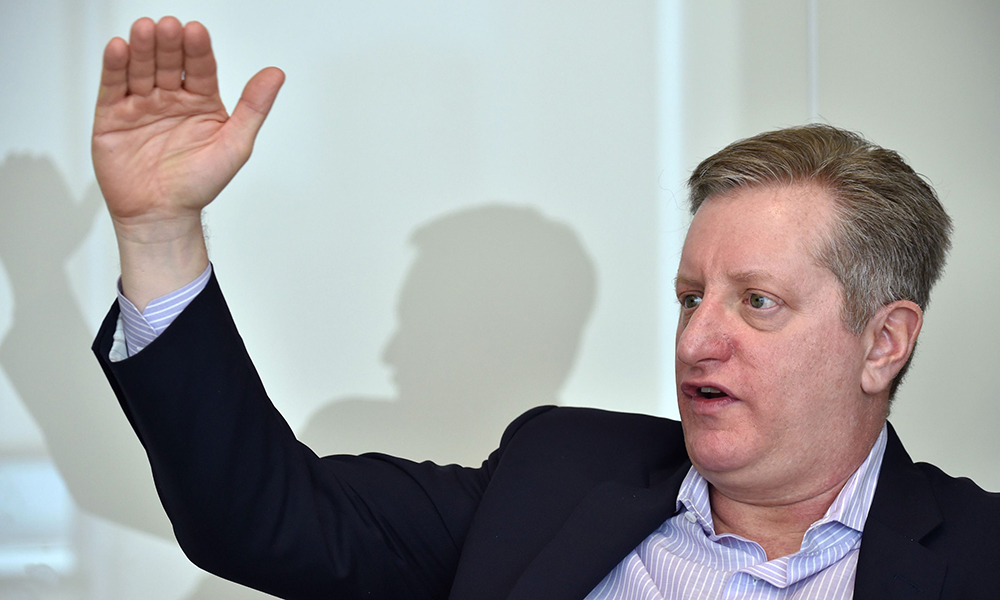
近两年来,美联储连番大幅加息,但美国经济仍然保持了较强韧性,这种现象令华尔街感到困惑,还有一些人认为,美国经济很快就将迎来衰退。
但是Neuberger Berman公司的高级理财经理史蒂夫·艾斯曼仍然非常看好美国金融市场,而且他的理由很简单——“末日论”者错了,因为随着AI赛道风起云涌,加上各类基建项目纷纷上马,美国经济依然动力十足。
上周四他在接受美国消费者新闻频道(CNBC)采访时表示:“我们还在持续发力,我们现在能得出的唯一结论,就是美国经济比史上任何时期都更有活力。”
艾斯曼人送外号“大空头”,这是因为他曾在全球金融危机前准确预测了次级贷即将暴雷。他表示,科技界的下一个大趋势,将是消费者纷纷购买新一代的AI手机和AI笔记本电脑。
比如苹果公司刚刚发布了一系列的全新AI功能,预计苹果用户很快将迎来一个大规模的换机周期。
艾斯曼还表示,他的公司已经在开始研究还有哪些股票将从AI浪潮中受益。不过他建议道,投资者如果持有苹果股票,则还应继续持有下去。
“绝对要坚持持仓苹果,它在整个AI叙事中的位置太重要了。”他说。
微软和谷歌的母公司Alphabet也在分别开发自家的AI技术,他们也是值得持有的“核心股”。艾斯曼也提到了一个他早就想回答的问题。
他指出,有一个理论认为,如果AI真的达到人们预期的智能程度,那么软件的编写成本就会“暴跌”,这样的话,一些公司的竞争优势和技术壁垒也将不再那么坚不可摧。
“所以我们可以想象,对硬件的重新估值还会继续下去,但是软件的某些部分将会被削弱。”他说。
换句话说,为AI技术提供支撑的硬件公司将会继续蓬勃发展,但软件公司的股票就不一定了。
英伟达股票近期的大幅上涨,就体现了市场近期向硬件板块的转变。作为AI芯片领域的龙头老大,英伟达今年的股价已经年飙升了166%,较去年同期上涨200%。英伟达现已成为一家市值超3万亿美元的公司,光它一家公司今年上涨的市值,就超过了标普500成分股涨幅的三分之一以上。
而且英伟达的财报也显示,市场对AI芯片的抢购潮仍然没有降温的趋势。
不过,Apollo公司的首席经济学家托尔斯滕·斯洛克也警告道,过度依赖一只股票,也意味着巨大的风险。
他在上周三的一篇文章中指出:“市场的集中度这么高,如果英伟达继续上涨,那么一切都还好。但是如果英伟达开始下跌,那么标普500指数就会受到重创。”(财富中文网)
译者:朴成奎
近两年来,美联储连番大幅加息,但美国经济仍然保持了较强韧性,这种现象令华尔街感到困惑,还有一些人认为,美国经济很快就将迎来衰退。
但是Neuberger Berman公司的高级理财经理史蒂夫·艾斯曼仍然非常看好美国金融市场,而且他的理由很简单——“末日论”者错了,因为随着AI赛道风起云涌,加上各类基建项目纷纷上马,美国经济依然动力十足。
上周四他在接受美国消费者新闻频道(CNBC)采访时表示:“我们还在持续发力,我们现在能得出的唯一结论,就是美国经济比史上任何时期都更有活力。”
艾斯曼人送外号“大空头”,这是因为他曾在全球金融危机前准确预测了次级贷即将暴雷。他表示,科技界的下一个大趋势,将是消费者纷纷购买新一代的AI手机和AI笔记本电脑。
比如苹果公司刚刚发布了一系列的全新AI功能,预计苹果用户很快将迎来一个大规模的换机周期。
艾斯曼还表示,他的公司已经在开始研究还有哪些股票将从AI浪潮中受益。不过他建议道,投资者如果持有苹果股票,则还应继续持有下去。
“绝对要坚持持仓苹果,它在整个AI叙事中的位置太重要了。”他说。
微软和谷歌的母公司Alphabet也在分别开发自家的AI技术,他们也是值得持有的“核心股”。艾斯曼也提到了一个他早就想回答的问题。
他指出,有一个理论认为,如果AI真的达到人们预期的智能程度,那么软件的编写成本就会“暴跌”,这样的话,一些公司的竞争优势和技术壁垒也将不再那么坚不可摧。
“所以我们可以想象,对硬件的重新估值还会继续下去,但是软件的某些部分将会被削弱。”他说。
换句话说,为AI技术提供支撑的硬件公司将会继续蓬勃发展,但软件公司的股票就不一定了。
英伟达股票近期的大幅上涨,就体现了市场近期向硬件板块的转变。作为AI芯片领域的龙头老大,英伟达今年的股价已经年飙升了166%,较去年同期上涨200%。英伟达现已成为一家市值超3万亿美元的公司,光它一家公司今年上涨的市值,就超过了标普500成分股涨幅的三分之一以上。
而且英伟达的财报也显示,市场对AI芯片的抢购潮仍然没有降温的趋势。
不过,Apollo公司的首席经济学家托尔斯滕·斯洛克也警告道,过度依赖一只股票,也意味着巨大的风险。
他在上周三的一篇文章中指出:“市场的集中度这么高,如果英伟达继续上涨,那么一切都还好。但是如果英伟达开始下跌,那么标普500指数就会受到重创。”(财富中文网)
译者:朴成奎
Wall Street has been puzzling over the U.S. economy’s continued resilience in the face of aggressive rate hikes from the Federal Reserve, with some still expecting a recession soon.
But Neuberger Berman senior portfolio manager Steve Eisman is bullish on financial markets and thinks the answer is clear: the doomsayers are wrong as the artificial intelligence race and boost in infrastructure projects drive the economy.
“We’re just powering through, and I think the only conclusion you can reach is that the U.S. economy is more dynamic than it’s ever been in its history,” he told CNBC on Thursday.
Eisman, whose famed bet against toxic mortgages leading up to the Great Financial Crisis was portrayed in The Big Short, added that the next stage in the tech narrative will be consumers buying new AI-enabled phones and laptops.
That means Apple, which just unveiled a series of new AI features, will see a massive refresh cycle of customers upgrading their iPhones, he predicted.
Eisman added that his firm has started researching what other stocks will benefit from the AI trend but maintained that investors should stick with any Apple stock they have.
“Definitely hold on to your Apple position,” he said. “It’s too central a figure in the whole story.”
Microsoft and Google parent Alphabet, which are developing separate AI technologies, are also “core holdings,” but Eisman also raised a question that he has been trying to answer.
One intriguing thesis posits that if AI is as successful as people expect, then the cost of creating software will “implode,” implying that the competitive advantages that some companies have won’t be as impenetrable, he said.
“So you can make an argument that the revaluation of hardware is going to continue and that some parts of software will derate,” he added.
In other words, tech hardware companies that supply the AI sector should keep booming, but not so much for software stocks.
Nvidia’s massive rally has exemplified the recent shift toward hardware stocks. Shares of the AI chip leader have soared 166% in the year to date and are up more than 200% from this time a year ago, making it a $3 trillion company that accounts for over a third of the S&P 500’s gains this year.
And Nvidia’s quarterly earnings show no sign that the rush to stock up on AI chips isn’t slowing down.
But relying so much on one stock also represents a big risk, Apollo Chief Economist Torsten Sløk warned.
“Such a high concentration implies that if NVIDIA continues to rise, then things are fine,” he wrote in a note on Wednesday. “But if it starts to decline, then the S&P 500 will be hit hard.”






